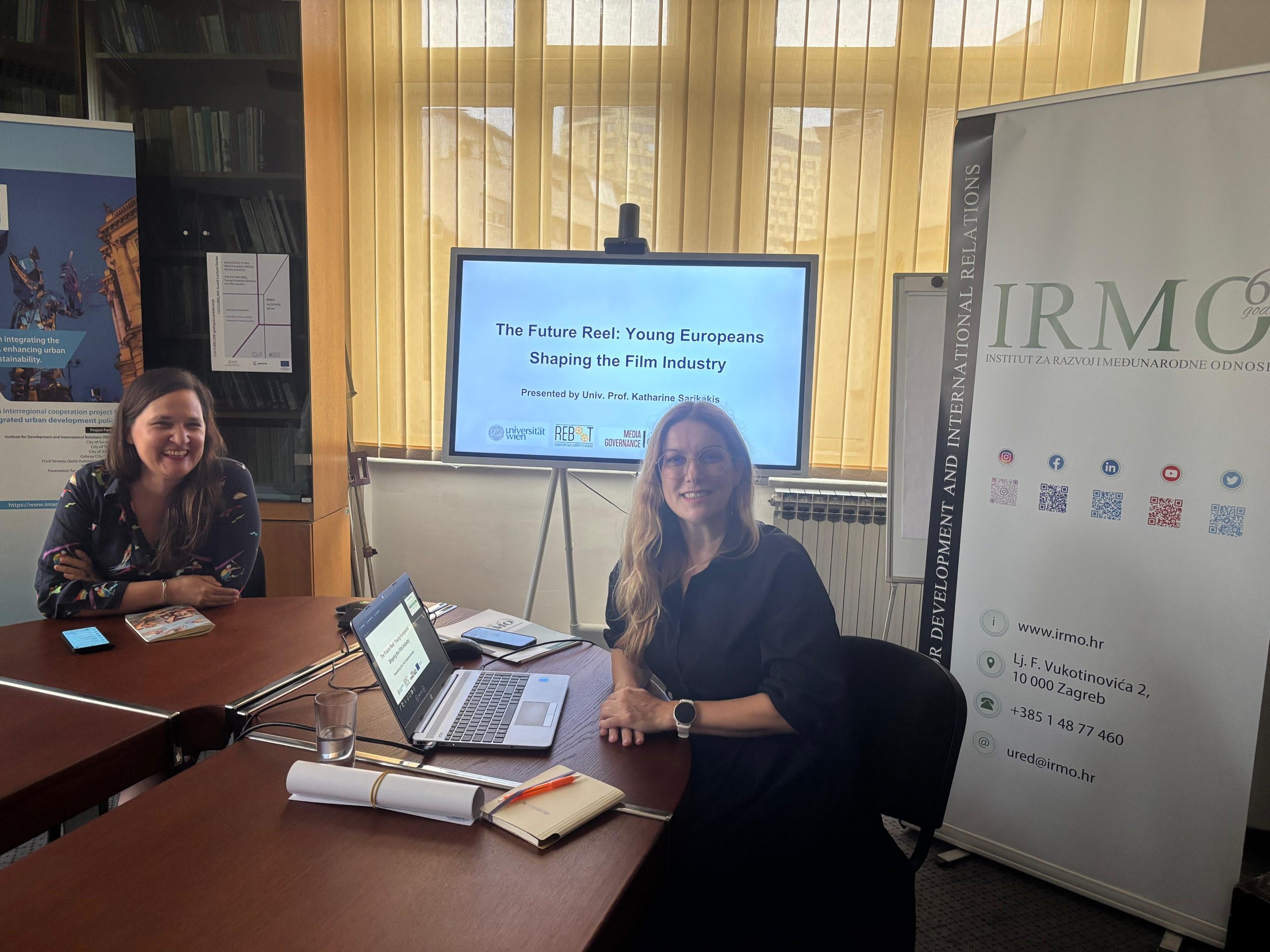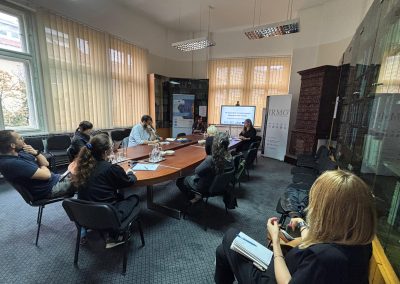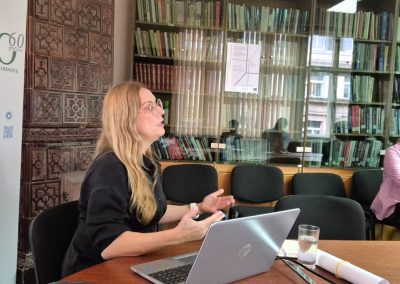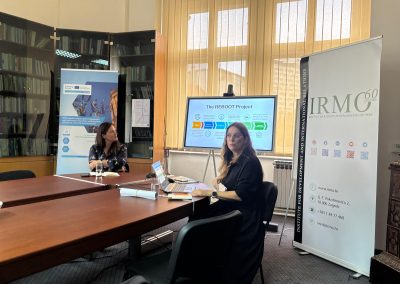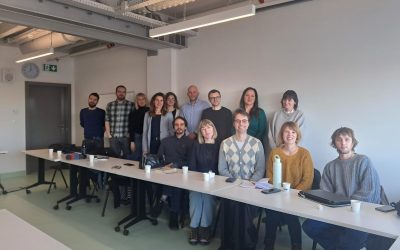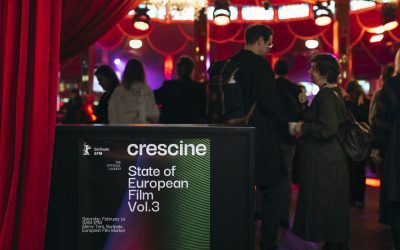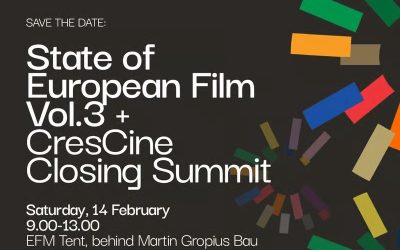As part of the Culturelink Guest Lecture Series, on the 24th of September 2025, at the Library of the Institute for Development and International Relations, Prof. Katharine Sarikakis, lecturer and researcher in communication science at the University of Vienna, delivered a lecture entitled “The Future Reel: Young Europeans Shaping the Film Industry”.
The lecture provided an overview of research data on how young people are both the present and the future of cultural creative industries, and on the ways they are dynamically shaping creative sectors such as the film industry.
The lecture was based on the research data from the Horizon Europe REBOOT project, which focuses on understanding and emphasizing the European film industry’s (EFI) international competitiveness. The key goal of REBOOT is to explore the institutional frameworks defining the competitiveness of the European film industry and to highlight how audiences, particularly young people and children, comprehend the notion of a competitive film industry today. The research addresses existing gaps in literature, noting a scarcity of recent studies on film literacy support programs and a lack of comprehensive understanding regarding youth perceptions, preferences, and engagement with film.
The research employed mixed methods approach, utilizing a large quantitative survey with 4,453 participants (Children aged 12-18 and Young Adults aged 18-24) and qualitative insights gathered from 508 young people in focus group interviews. The research encompassed nine European countries: Austria, Belgium, Finland, France, Greece, Italy, Poland, Spain, and Turkey. The findings reveal that streaming has redefined how young people consume films. A significant majority (75.6%) prefer watching films on Video on Demand (VoD) via TV or computers, noting that streaming platforms offer a wider range of options compared to previous traditional models. Film plays a central role in their lives, with 77.6% watching films weekly or a few times per week. While VoD is dominant, cinema remains a valued and irreplaceable experience, often linked to social occasions with friends, family, or romantic partners. Young people are selective and critically aware of the film range, generally expressing satisfaction with the variety offered by streaming services. However, some youth report disappointment with newer films, perceiving them as repetitive, formulaic, and driven merely by profit. For young people, emotional attachment, inspiration, and connection are the most important things in films, and they are drawn to engaging plots and characters from different backgrounds. Comedies are their most preferred genre (61.8%).
Regarding preferences, young people generally recognize differences between European and US films. US films have become the standard reference point for many young European audiences due to wide availability and popularity. While European films are sometimes criticized for having lower production values, slower pacing, and being less commercial or spectacular, youth also perceive them as artistic, biographical, and thoughtful. Many believe European cinema is of higher quality precisely because it is less commercial and less propagandistic, offering deeper storytelling that may require more analytical engagement from the viewer. The dominance of American content is reflected in the list of the top 15 youth’s favourite films, which consists mostly of long-standing, modern mainstream American box-office hits and franchises, such as Harry Potter, Interstellar, and Star Wars. The research found that European films lack sufficient visibility and promotion outside their country of origin among young people.
Furthermore, prof. Sarikakis highlighted the emergence of youth as creators. Almost a quarter of young people (23.1%) produce and share video content online. This signals a new filmmaking paradigm where young people are democratizing video and filmmaking education through autodidactic models and everyday equipment, primarily smartphones (79.2%). They share their content on social media platforms like TikTok, Instagram, and YouTube, often producing material in English for greater accessibility. However, young people express interest in professional work while simultaneously reporting barriers to filmmaking, such as the lack of proper equipment, resources, and institutional connections.
In conclusion, prof. Sarikakis underlined several policy recommendations for fostering competitiveness of the European film industry, based on the REBOOT project research results. These include urging the European Commission to increase the visibility of European films on social media by collaborating with content creators and influencers. It is also suggested that the Commission fund streaming services that prioritize European content for youth, foster the annual production of films aimed specifically at young audiences in national industries, and incorporate comprehensive film education into compulsory schooling across European State Members. Finally, the European film industry must embrace and adopt the democratic filmmaking paradigm now employed by young creators.
The discussion after the lecture touched upon the gaps between audiovisual policies and practices at both national and European levels, the need to design new models of youth involvement in film production, and the issue of expanding film education programs and strengthening support for youth filmmaking. In addition to the issues of methodology and methods used, and the challenges of conducting such complex research at the European level, the need for a broader understanding of the concept of media governance (beyond the institutional approach) was also discussed, as was the need for greater communication of scientific research data not only to the industry, but also to other stakeholders.
The moderator of the event was Dr. Jaka Primorac from the Department of Culture and Communication, IRMO.
On the website of the The Culturelink Centre Repository, content related to Culturelink Guest Lecture Series by Prof. Sarikakis can be found: https://kultura.irmo.hr/culturelink-en/repository/
The lecture was organised in collaboration with the CresCine project, on which you can find out more at: https://www.crescine.eu/
